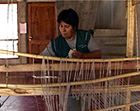
Tinku Kamayu 2008
Distributed by Third World Newsreel, 545 Eighth Avenue, 10th Floor, New York, NY 10018; 212-947-9277
Produced by Mabel Maio
Directed by Mabel Maio
DVD, color, 30 min.
Jr. High - Adult
Ethnic Studies, Gender Studies, Latin American Studies, Women's Studies
Date Entered: 11/03/2009
Reviewed by Kayo Denda, Rutgers UniversityTinku Kamayu is a documentary directed and produced by the Argentinean filmmaker Mabel Maio, portraying the group of women spinners and weavers in Santa Maria, Catamarca province, in the Northwestern region of Argentina. The group, Tinku Kamayu, which means “working together” in Quechua language, rediscovered the tradition of spinning and weaving in response to Argentina’s economic crisis in 2001. Margarita Ramirez, the founder, narrates the accounts of the women who did not succumb to the economic hardship and responded by engaging in useful work. Ramirez speaks of her pride in re-establishing traditional craft making and the benefits the community has experienced with their productive activity. The weavers and the herders of the animals, llamas and vicuñas mostly, have established a tight network that collaborate and exchange information on topics of mutual interest. They include feeding ground quality and the nutrition of animals that ultimately improve the quality of their wool. In addition to serving as a source of income, the documentary suggests that the cooperative functions as a space for women’s empowerment insulated from domestic violence that occurs frequently in this impoverished mountainous community.
Maio clearly wishes to give prominence to Margarita Ramirez’s accomplishments, and the camera focuses mainly on her narrative. Polita Condori is the only other woman captured on the camera, mostly alone, but also with her daughter. Polita seems to provide the background singing in the film, but her role is left ambiguous. Additional testimonials, from Tinku Kamayu women and men associated with them, would offer an opportunity for a diversity of narratives and experiences, enriching the representation of the cooperative. Nevertheless, the film presents a constructive image of Tinku Kamayu women not as victims, but as those who resisted poverty with creative and productive work. The camera captures the breathtaking landscape of the Andes Mountains in Argentina and an Andean flute provides the background music, bringing to the viewer cultural elements that supplement the narratives of these courageous women. Additional information on Tinku Kamayu is available at their website.